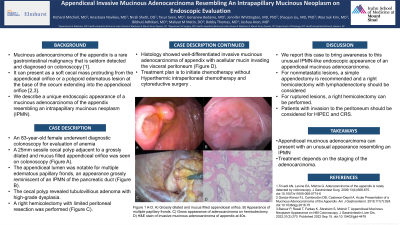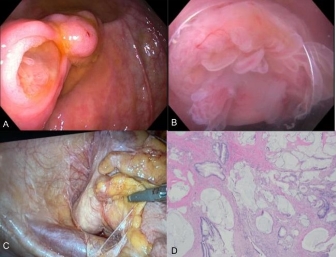Tuesday Poster Session
Category: Colon
P3698 - Appendiceal Invasive Mucinous Adenocarcinoma Resembling an Intrapapillary Mucinous Neoplasm on Endoscopic Evaluation
Tuesday, October 29, 2024
10:30 AM - 4:00 PM ET
Location: Exhibit Hall E

Has Audio

Richard Mitchell, MD
Elmhurst Hospital Center / Icahn School of Medicine at Mount Sinai
Queens, NY
Presenting Author(s)
Richard Mitchell, MD1, Anastasia Novikov, MD2, Nirali Sheth, MD2, Tasur Seen, MD1, Genanew Bedanie, MD1, Jennifer Whittington, MD, PhD2, Shaojun Liu, MD, PhD3, Woo Suk Kim, MD1, Bibhuti Adhikari, MD1, Maliyat M Matin, DO2, Bobby Thomas, MD1, Joshua Aron, MD2
1Elmhurst Hospital Center / Icahn School of Medicine at Mount Sinai, Queens, NY; 2Elmhurst Hospital Center / Icahn School of Medicine at Mount Sinai, Elmhurst, NY; 3Elmhurst Hospital Center, Elmhurst, NY
Introduction: Mucinous adenocarcinoma of the appendix is a rare gastrointestinal malignancy often discovered after appendectomy. They are seldom detected and diagnosed on colonoscopy [1]. When detected, they can present as a soft cecal mass protruding from the appendiceal orifice or a polypoid, edematous lesion at the base of the cecum extending into the appendiceal orifice [2,3]. We describe a unique endoscopic appearance of a mucinous adenocarcinoma of the appendix resembling an intrapapillary mucinous neoplasm (IPMN).
Case Description/Methods: An 83-year-old female underwent diagnostic colonoscopy for evaluation of anemia which identified a 25mm sessile cecal polyp adjacent to a grossly dilated and mucus filled appendiceal orifice (a). The appendiceal lumen was notable for multiple edematous papillary fronds, an appearance grossly reminiscent of an IPMN of the pancreatic duct (b). A right hemicolectomy with limited peritoneal resection was performed after pathology of the cecal polyp revealed tubulovillous adenoma with high-grade dysplasia. Gross appearance of the appendiceal lesion was visualized during hemicolectomy (c). Histology showed well-differentiated invasive mucinous adenocarcinoma of appendix with acellular mucin invading the visceral peritoneum (d). She was discussed on tumor board with the plan to initiate chemotherapy without heated intraperitoneal chemotherapy (HIPEC) and cytoreductive surgery (CRS).
Discussion: We report this case to bring awareness to this unusual IPMN-like endoscopic appearance of an appendiceal mucinous adenocarcinoma. Treatment depends on the staging of the adenocarcinoma. For ruptured lesions, a right hemicolectomy can be performed. Patients with invasion to the peritoneum should be considered for HIPEC and CRS.

Disclosures:
Richard Mitchell, MD1, Anastasia Novikov, MD2, Nirali Sheth, MD2, Tasur Seen, MD1, Genanew Bedanie, MD1, Jennifer Whittington, MD, PhD2, Shaojun Liu, MD, PhD3, Woo Suk Kim, MD1, Bibhuti Adhikari, MD1, Maliyat M Matin, DO2, Bobby Thomas, MD1, Joshua Aron, MD2. P3698 - Appendiceal Invasive Mucinous Adenocarcinoma Resembling an Intrapapillary Mucinous Neoplasm on Endoscopic Evaluation, ACG 2024 Annual Scientific Meeting Abstracts. Philadelphia, PA: American College of Gastroenterology.
1Elmhurst Hospital Center / Icahn School of Medicine at Mount Sinai, Queens, NY; 2Elmhurst Hospital Center / Icahn School of Medicine at Mount Sinai, Elmhurst, NY; 3Elmhurst Hospital Center, Elmhurst, NY
Introduction: Mucinous adenocarcinoma of the appendix is a rare gastrointestinal malignancy often discovered after appendectomy. They are seldom detected and diagnosed on colonoscopy [1]. When detected, they can present as a soft cecal mass protruding from the appendiceal orifice or a polypoid, edematous lesion at the base of the cecum extending into the appendiceal orifice [2,3]. We describe a unique endoscopic appearance of a mucinous adenocarcinoma of the appendix resembling an intrapapillary mucinous neoplasm (IPMN).
Case Description/Methods: An 83-year-old female underwent diagnostic colonoscopy for evaluation of anemia which identified a 25mm sessile cecal polyp adjacent to a grossly dilated and mucus filled appendiceal orifice (a). The appendiceal lumen was notable for multiple edematous papillary fronds, an appearance grossly reminiscent of an IPMN of the pancreatic duct (b). A right hemicolectomy with limited peritoneal resection was performed after pathology of the cecal polyp revealed tubulovillous adenoma with high-grade dysplasia. Gross appearance of the appendiceal lesion was visualized during hemicolectomy (c). Histology showed well-differentiated invasive mucinous adenocarcinoma of appendix with acellular mucin invading the visceral peritoneum (d). She was discussed on tumor board with the plan to initiate chemotherapy without heated intraperitoneal chemotherapy (HIPEC) and cytoreductive surgery (CRS).
Discussion: We report this case to bring awareness to this unusual IPMN-like endoscopic appearance of an appendiceal mucinous adenocarcinoma. Treatment depends on the staging of the adenocarcinoma. For ruptured lesions, a right hemicolectomy can be performed. Patients with invasion to the peritoneum should be considered for HIPEC and CRS.
- Trivedi AN, Levine EA, Mishra G. Adenocarcinoma of the appendix is rarely detected by colonoscopy. J Gastrointest Surg. 2009;13(4):668-675. doi:10.1007/s11605-008-0774-6
- Garcia-Alonso FJ, Cambrodón DB, Castanon-Deprit A. Acute Presentation of a Mucinous Adenocarcinoma of the Appendix. Am J Gastroenterol. 2016;111(7):924. doi:10.1038/ajg.2016.75
- Bacsur P, Resál T, Farkas K, Ábrahám S, Molnár T. Appendiceal Mucinous Neoplasm Appearance on NBI Colonoscopy. J Gastrointestin Liver Dis. 2022;31(3):270. Published 2022 Sep 15. doi:10.15403/jgld-4478

Figure: Figure 1 A-D. A) Grossly dilated and mucus filled appendiceal orifice. B) Appearance of multiple papillary fronds. C) Gross appearance of adenocarcinoma on hemicolectomy. D) H&E stain of invasive mucinous adenocarcinoma of appendix at 40x.
Disclosures:
Richard Mitchell indicated no relevant financial relationships.
Anastasia Novikov indicated no relevant financial relationships.
Nirali Sheth indicated no relevant financial relationships.
Tasur Seen indicated no relevant financial relationships.
Genanew Bedanie indicated no relevant financial relationships.
Jennifer Whittington indicated no relevant financial relationships.
Shaojun Liu indicated no relevant financial relationships.
Woo Suk Kim indicated no relevant financial relationships.
Bibhuti Adhikari indicated no relevant financial relationships.
Maliyat M Matin indicated no relevant financial relationships.
Bobby Thomas indicated no relevant financial relationships.
Joshua Aron indicated no relevant financial relationships.
Richard Mitchell, MD1, Anastasia Novikov, MD2, Nirali Sheth, MD2, Tasur Seen, MD1, Genanew Bedanie, MD1, Jennifer Whittington, MD, PhD2, Shaojun Liu, MD, PhD3, Woo Suk Kim, MD1, Bibhuti Adhikari, MD1, Maliyat M Matin, DO2, Bobby Thomas, MD1, Joshua Aron, MD2. P3698 - Appendiceal Invasive Mucinous Adenocarcinoma Resembling an Intrapapillary Mucinous Neoplasm on Endoscopic Evaluation, ACG 2024 Annual Scientific Meeting Abstracts. Philadelphia, PA: American College of Gastroenterology.
